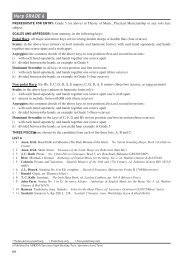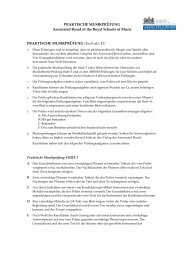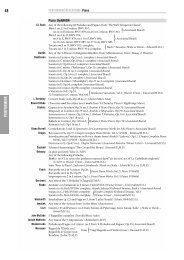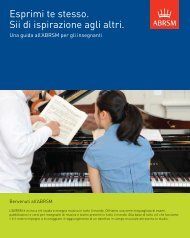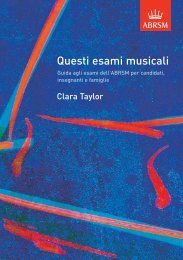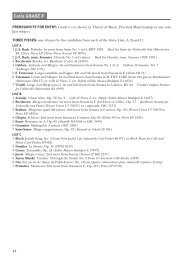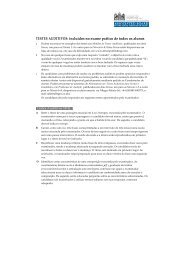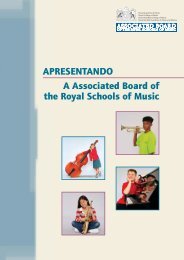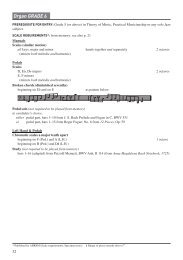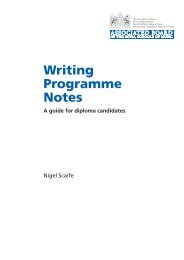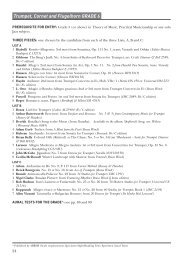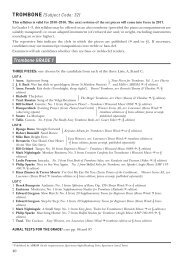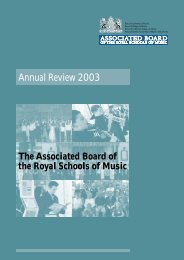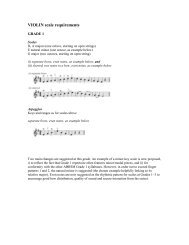diplomas at a glance - ABRSM
diplomas at a glance - ABRSM
diplomas at a glance - ABRSM
Create successful ePaper yourself
Turn your PDF publications into a flip-book with our unique Google optimized e-Paper software.
Diplomas <strong>at</strong> a <strong>glance</strong><br />
A guide to the Diploma Syllabus from 2005<br />
Music Direction Music Performance Instrumental/Vocal Teaching
About this guide<br />
This guide to the Associ<strong>at</strong>ed Board’s Diplomas is designed to help you decide which<br />
diploma is right for you. It does not replace the full Diploma Syllabus.<br />
Before you start to prepare for your Diploma, you should read the relevant syllabus so<br />
th<strong>at</strong> you are aware of wh<strong>at</strong> is required of you both before and during the exam.<br />
The Diploma Syllabus from 2005 is published as three separ<strong>at</strong>e syllabus documents,<br />
one for each subject:<br />
● Music Direction<br />
● Music Performance<br />
● Instrumental/Vocal Teaching<br />
All syllabus documents are available <strong>at</strong> www.abrsm.org/exams/<strong>diplomas</strong> or by request<br />
from the Associ<strong>at</strong>ed Board.<br />
Introducing the Diplomas<br />
Entry requirements<br />
The Associ<strong>at</strong>ed Board’s Diplomas provide assessments for a wide range of musicians<br />
whether studying for a career in music, working as a professional musician, or just looking<br />
for a new challenge.<br />
There are three Diploma subjects:<br />
● Music Direction<br />
● Music Performance<br />
● Instrumental/Vocal Teaching<br />
For each subject there are three levels of Diploma:<br />
● Dip<strong>ABRSM</strong> Diploma of The Associ<strong>at</strong>ed Board of the Royal Schools of Music<br />
● LRSM Licenti<strong>at</strong>e of the Royal Schools of Music<br />
● FRSM Fellowship of the Royal Schools of Music<br />
The Associ<strong>at</strong>ed Board’s Diplomas are recognised by musicians around the world and they<br />
are comp<strong>at</strong>ible with systems of assessment used in higher educ<strong>at</strong>ion.<br />
All Associ<strong>at</strong>ed Board Diplomas are letter-bearing. With Dip<strong>ABRSM</strong>, LRSM or FRSM after<br />
your name, musicians, employers, pupils and their parents will know th<strong>at</strong> you have a<br />
professional qualific<strong>at</strong>ion from a respected organis<strong>at</strong>ion.<br />
By studying for and taking an Associ<strong>at</strong>ed Board Diploma you will gain skills, knowledge<br />
and recognition in your chosen field. We hope th<strong>at</strong> you find the experience stimul<strong>at</strong>ing,<br />
challenging and worthwhile.<br />
When you enter for a Diploma you will need to show th<strong>at</strong> you have reached the minimum<br />
standard needed to <strong>at</strong>tempt the exam – we refer to this as a ‘prerequisite’.<br />
We allow a range of substitutions, or altern<strong>at</strong>ives, for these prerequisites. You can also<br />
offer appropri<strong>at</strong>e professional experience such as experience as a regular concert<br />
performer or as a successful instrumental teacher.<br />
Further inform<strong>at</strong>ion about prerequisites, substitutions and appropri<strong>at</strong>e professional<br />
experience can be found in the relevant syllabus and <strong>at</strong> www.abrsm.org/exams/<strong>diplomas</strong>
Dip<strong>ABRSM</strong>: Music Direction<br />
For further inform<strong>at</strong>ion refer to the Diploma Syllabus, Music Direction<br />
page<br />
Prerequisite ● <strong>ABRSM</strong> Grade 8 in any Practical subject or a substitution<br />
18<br />
Section 1 Rehearsal and 30-35 minutes A rehearsal and performance using an instrumental 7-8<br />
Performance<br />
or choral ensemble provided and directed by you.<br />
Section 2.1 Viva Voce Up to 18 minutes A discussion with the examiners – an opportunity to<br />
demonstr<strong>at</strong>e your knowledge, approach and<br />
understanding.<br />
Questions will cover your Rehearsal and<br />
Performance, Programme Notes and Arrangement,<br />
and other aspects of directing.<br />
8-9<br />
Programme 1,100 words (+ – 10%) Programme notes rel<strong>at</strong>ing to your Rehearsal and 24-26<br />
Notes<br />
Performance repertoire.<br />
Section 2.2 Arrangement<br />
An instrumental or choral arrangement for your 24 &<br />
ensemble.<br />
28-29<br />
LRSM: Music Direction<br />
Prerequisite ● Dip<strong>ABRSM</strong> (Music Direction) or a substitution<br />
Section 1 Rehearsal and 40-45 minutes A rehearsal and performance using an instrumental<br />
Performance<br />
or choral ensemble provided and directed by you.<br />
Section 2.1 Viva Voce Up to 20 minutes A discussion with the examiners – an opportunity to<br />
demonstr<strong>at</strong>e your knowledge, approach and<br />
understanding.<br />
Questions will cover your Rehearsal and<br />
Performance, Programme Notes and Arrangement,<br />
and other aspects of directing.<br />
Programme 1,800 words (+ – 10%) Programme notes rel<strong>at</strong>ing to your Rehearsal and<br />
Notes<br />
Performance repertoire.<br />
Section 2.2 Arrangement<br />
An instrumental or choral arrangement for your<br />
ensemble.<br />
FRSM: Music Direction<br />
Prerequisite ● LRSM (Music Direction) or a substitution<br />
Section 1 Rehearsal and 55-60 minutes A rehearsal and performance using an instrumental<br />
Performance<br />
or choral ensemble provided and directed by you.<br />
Section 2.1 Viva Voce Up to 25 minutes A discussion with the examiners – an opportunity<br />
to demonstr<strong>at</strong>e your knowledge, approach and<br />
understanding.<br />
Questions will cover your Rehearsal and<br />
Performance, Written Submission and<br />
Arrangement, and other aspects of directing.<br />
Written 4,500 words (+ – 10%) A written submission rel<strong>at</strong>ing to issues connected<br />
Submission<br />
with your Rehearsal and Performance repertoire.<br />
Section 2.2 Arrangement<br />
An instrumental or choral arrangement for your<br />
ensemble.<br />
page<br />
18<br />
10<br />
11-12<br />
24-26<br />
24 &<br />
28-29<br />
page<br />
19<br />
13<br />
14-15<br />
24 &<br />
26-27<br />
24 &<br />
28-29
Dip<strong>ABRSM</strong>: Music Performance<br />
For further inform<strong>at</strong>ion refer to the Diploma Syllabus, Music Performance<br />
page<br />
Prerequisite ● <strong>ABRSM</strong> Grade 8 Practical in the instrument presented or a substitution<br />
20<br />
Section 1 Recital 35 minutes (+ – 10%) A recital with optional free choice of repertoire. 7-8<br />
Section 2.1 Viva Voce Up to 12 minutes A discussion with the examiners – an opportunity to<br />
demonstr<strong>at</strong>e your knowledge, approach and<br />
understanding.<br />
Questions will cover your Recital and Programme<br />
Notes, and other aspects of performing.<br />
9<br />
Programme 1,100 words (+ – 10%) Programme notes rel<strong>at</strong>ing to your Recital<br />
24-26<br />
Notes<br />
repertoire.<br />
Section 2.2 Quick Study Up to 10 minutes Performance of a short piece of previously unseen 10<br />
(including 5 minutes’ music of a standard similar to <strong>ABRSM</strong> Grade 6<br />
prepar<strong>at</strong>ion time) repertoire.<br />
LRSM: Music Performance<br />
Prerequisite ● Dip<strong>ABRSM</strong> (Music Performance) in the instrument presented or a substitution<br />
Section 1 Recital 40 minutes (+ – 10%) A recital with optional free choice of repertoire.<br />
Specialist Option<br />
You may choose to present one third of your Recital<br />
within one of the following specialist areas:<br />
orchestral musician; chamber ensemble member;<br />
keyboard accompanist.<br />
Section 2.1 Viva Voce Up to 15 minutes A discussion with the examiners – an opportunity to<br />
demonstr<strong>at</strong>e your knowledge, approach and<br />
understanding.<br />
Questions will cover your Recital and Programme<br />
Notes, and other aspects of performing.<br />
Programme 1,800 words (+ – 10%) Programme notes rel<strong>at</strong>ing to your Recital<br />
Notes<br />
repertoire.<br />
Section 2.2 Quick Study Up to 10 minutes Performance of a short piece of previously unseen<br />
(including 5 minutes’ music of a standard similar to <strong>ABRSM</strong> Grade 7<br />
prepar<strong>at</strong>ion time) repertoire.<br />
page<br />
20<br />
11-12<br />
13<br />
24-26<br />
FRSM: Music Performance<br />
page<br />
Prerequisite ● LRSM (Music Performance) in the instrument presented or a substitution<br />
21<br />
Section 1 Recital 50 minutes (+ – 10%) A recital with optional free choice of repertoire.<br />
Specialist Option<br />
You may choose to present <strong>at</strong> least half, and no<br />
more than two thirds, of your Recital within one of<br />
the following specialist areas: orchestral musician;<br />
chamber ensemble member; keyboard accompanist.<br />
14-15<br />
Section 2.1 Viva Voce Up to 20 minutes A discussion with the examiners – an opportunity to<br />
demonstr<strong>at</strong>e your knowledge, approach and<br />
understanding.<br />
Questions will cover your Recital and Written<br />
Submission, and other aspects of performing.<br />
16<br />
Written 4,500 words (+ – 10%) A written submission rel<strong>at</strong>ing to issues connected 24 &<br />
Submission<br />
with your Recital repertoire.<br />
26-27<br />
Section 2.2 Quick Study Up to 10 minutes Performance of a short piece of previously unseen 17<br />
(including 5 minutes’ music of a standard similar to <strong>ABRSM</strong> Grade 8<br />
prepar<strong>at</strong>ion time) repertoire.<br />
13
For further inform<strong>at</strong>ion refer to the Diploma Syllabus, Instrumental/Vocal Teaching<br />
Dip<strong>ABRSM</strong>: Principles of Instrumental/Vocal Teaching<br />
page<br />
Prerequisites ● <strong>ABRSM</strong> Grade 8 Practical in the instrument taught or a substitution<br />
and ● <strong>ABRSM</strong> Grade 6 Theory (1992 syllabus) or a substitution<br />
and ● you must be 18 or older <strong>at</strong> the time of entry<br />
22<br />
Section 1 Teaching Skills Up to 40 minutes A discussion with the examiners including<br />
7-10<br />
Viva Voce<br />
demonstr<strong>at</strong>ions of teaching approaches and<br />
performance of extracts from <strong>ABRSM</strong> Grade 6<br />
repertoire.<br />
You should be prepared to discuss your Written<br />
Submission.<br />
Section 2.1 Written 1,800 words (+ – 10%) A written submission on a topic chosen from the 28-31<br />
Submission<br />
syllabus.<br />
Section 2.2 Quick Study Up to 10 minutes Performance of a short piece of previously unseen 11<br />
(including 5 minutes’ music of a standard similar to <strong>ABRSM</strong> Grade 6<br />
prepar<strong>at</strong>ion time) repertoire.<br />
LRSM: Instrumental/Vocal Teaching<br />
Prerequisites ● Dip<strong>ABRSM</strong> (Principles of Instrumental/Vocal Teaching) in the instrument taught<br />
or a substitution<br />
and ● <strong>ABRSM</strong> Grade 8 Theory (1992 syllabus) or a substitution<br />
and ● you must be 20 or older <strong>at</strong> the time of the exam<br />
Case Study You must submit these two sections <strong>at</strong> least three months before the closing d<strong>at</strong>e for<br />
Portfolio & entry. You must pass these sections before you can proceed with the rest of the LRSM.<br />
Video of<br />
Teaching<br />
Case Study Portfolio: written case studies based on your work with three pupils.<br />
Practice Video of Teaching Practice: a video fe<strong>at</strong>uring <strong>at</strong> least two pupils, one of whom must be<br />
covered in the Case Study Portfolio.<br />
Section 1 Teaching Skills Up to 50 minutes A discussion with the examiners including<br />
Viva Voce<br />
demonstr<strong>at</strong>ions of teaching approaches and<br />
performance of extracts from <strong>ABRSM</strong> Grade 8<br />
repertoire.<br />
You should be prepared to discuss your Written<br />
Submission.<br />
Section 2.1 Written 4,500 words (+ – 10%) A written submission on a topic chosen from the<br />
Submission<br />
syllabus.<br />
Section 2.2 Quick Study Up to 10 minutes Performance of a short piece of previously unseen<br />
(including 5 minutes’ music of a standard similar to <strong>ABRSM</strong> Grade 7<br />
prepar<strong>at</strong>ion time) repertoire.<br />
FRSM: Music Educ<strong>at</strong>ion<br />
Prerequisite ● LRSM (Instrumental/Vocal Teaching) in the instrument taught or a substitution<br />
Section 1 Teaching Skills Up to 60 minutes A discussion with the examiners including<br />
Viva Voce<br />
demonstr<strong>at</strong>ions of teaching approaches and<br />
performance of extracts from Dip<strong>ABRSM</strong> (Music<br />
Performance) repertoire.<br />
You should be prepared to discuss your Written<br />
Submission.<br />
Section 2.1 Written 11,000 words A written submission on an approved topic of your<br />
Submission (+ – 10%)<br />
choice.<br />
Section 2.2 Quick Study Up to 10 minutes Performance of a short piece of previously unseen<br />
(including 5 minutes’ music of a standard similar to <strong>ABRSM</strong> Grade 8<br />
prepar<strong>at</strong>ion time) repertoire.<br />
page<br />
23<br />
28 &<br />
32-34<br />
12-15<br />
28-31<br />
15<br />
page<br />
23<br />
16-18<br />
28-30<br />
19
Next steps<br />
Your questions<br />
This guide provides an outline of the various Diploma requirements. Before making any<br />
decisions about which Diploma to work towards, and before entering for a Diploma,<br />
please read the relevant Diploma Syllabus.<br />
The Diploma Syllabus from 2005 is available in three parts, one for each subject:<br />
● Music Direction<br />
● Music Performance<br />
● Instrumental/Vocal Teaching<br />
The syllabuses provide comprehensive inform<strong>at</strong>ion on all aspects of the diploma exams<br />
including requirements, repertoire lists, guidance for candid<strong>at</strong>es and the criteria against<br />
which you will be assessed.<br />
You can obtain copies of the syllabuses in one of the following ways:<br />
● <strong>at</strong> www.abrsm.org/exams/<strong>diplomas</strong><br />
● from your local Associ<strong>at</strong>ed Board Represent<strong>at</strong>ive or Contact, or Honorary Local<br />
Represent<strong>at</strong>ive (UK and Ireland)<br />
● from your local music retailer<br />
● from the Associ<strong>at</strong>ed Board’s office in London (see below)<br />
If you have any questions about the Diploma Syllabus from 2005 please contact us in one<br />
of the following ways:<br />
UK and Ireland<br />
telephone +44 20 7467 8829<br />
email <strong>diplomas</strong>@abrsm.ac.uk<br />
All other countries<br />
Get in touch with your local Associ<strong>at</strong>ed Board Represent<strong>at</strong>ive or Contact<br />
(listed <strong>at</strong> www.abrsm.org and in the Examin<strong>at</strong>ion Regul<strong>at</strong>ions & Inform<strong>at</strong>ion,<br />
Intern<strong>at</strong>ional Edition).<br />
Altern<strong>at</strong>ively, contact the Intern<strong>at</strong>ional Department <strong>at</strong> the Associ<strong>at</strong>ed Board’s<br />
office in London:<br />
telephone +44 20 7467 8818<br />
email intern<strong>at</strong>ional<strong>diplomas</strong>@abrsm.ac.uk
Free support m<strong>at</strong>erials<br />
Available <strong>at</strong> www.abrsm.org/exams/<strong>diplomas</strong> or by request from the<br />
Associ<strong>at</strong>ed Board’s office in London.<br />
Reading List<br />
A regularly upd<strong>at</strong>ed list of written resources listed by subject and instrument.<br />
Writing Programme Notes: A guide for diploma candid<strong>at</strong>es<br />
A practical guide to writing programme notes, by Nigel Scaife,<br />
the Associ<strong>at</strong>ed Board’s Syllabus Principal.<br />
Support m<strong>at</strong>erials from <strong>ABRSM</strong> Publishing<br />
Available from music retailers or <strong>at</strong> www.abrsmpublishing.com<br />
Performer’s Guides<br />
A Performer’s Guide<br />
to Music of the<br />
Baroque Period<br />
1-86096-192-4<br />
Book and CD<br />
Music in Words<br />
Trevor Herbert<br />
1-86096-236-X<br />
A guide to researching and writing about music, from programme notes<br />
to dissert<strong>at</strong>ions. It includes a ‘how to’ section and an introduction<br />
to using the internet for research.<br />
Achieving Success<br />
Preparing for your Diploma in Music Performance<br />
DVD PAL 1-86096-399-4; DVD NTSC 1-86096-596-2; VHS PAL 1-86096-540-7<br />
Essential prepar<strong>at</strong>ion m<strong>at</strong>erial for anyone entering for a Diploma in<br />
Music Performance. Introduced by Clara Taylor, Chief Examiner,<br />
Achieving Success includes exemplar performances on a variety of<br />
instruments, interviews with a diploma examiner and past candid<strong>at</strong>es,<br />
and guidance on how to prepare for the exam.<br />
The DVD contains optional Chinese subtitles and Cantonese dubbing.<br />
A Performer’s Guide<br />
to Music of the<br />
Classical Period<br />
1-86096-193-2<br />
Book and CD<br />
A Performer’s Guide<br />
to Music of the<br />
Romantic Period<br />
1-86096-194-0<br />
Book and CD<br />
These stimul<strong>at</strong>ing guides are a valuable resource for students preparing<br />
programme notes for diploma exams. They will also help students achieve<br />
stylistic performances of music of the Baroque, Classical and Romantic periods.<br />
Each book contains a full-length CD of excerpts referred to throughout the text.
24 Portland Place<br />
London W1B 1LU<br />
United Kingdom<br />
www.abrsm.org<br />
Registered Charity No. 292182



